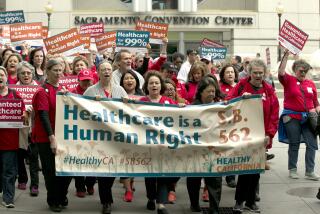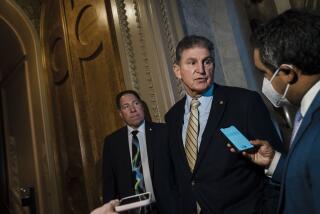House, Senate Panels OK Rival Health Plans
- Share via
WASHINGTON — In a major step forward for the White House, the House Ways and Means Committee Thursday became the third congressional panel to approve a bill designed to achieve President Clinton’s goal of providing health insurance for all Americans starting in 1998.
The Senate Finance Committee, however, dealt a potentially devastating blow to Clinton’s key proposal for universal coverage by rejecting any requirement that employers pay 80% of workers’ insurance costs--the so-called employer mandate.
The conflicting votes foreshadowed a coming clash over the central issue in health reform--the scope of coverage and how to pay for it--and the uphill struggle facing Clinton and his allies as they try to persuade a majority of the House and Senate to support the employer mandate.
While even some ardent backers question whether the Ways and Means bill can pass the House in its present form, the hard-won, 20-18 endorsement by the influential panel provided some needed momentum for the President’s drive for universal coverage.
Clinton called the bill’s approval “a giant stride forward on the road to comprehensive health care” while White House aides minimized the setback for the Administration by the Senate Finance panel.
At the same time, the President strongly attacked a rival plan put forward by Senate Minority Leader Bob Dole (R-Kan.) and 38 other Republican senators. The criticism came at a meeting with small business leaders at the White House.
“It does a little bit for the poor, it leaves all the powerful vested interest groups with everything they’ve got and it walks away from the middle class and small business,” the President said of the GOP alternative, which would attempt to make health insurance more accessible through incentives. “It is politics as usual.”
Rep. Sam Gibbons (D-Fla.), acting chairman of the Ways and Means panel, said the committee’s bill, which would provide coverage of nearly all Americans by 1998 and pay for it mostly by requiring employers and their employees to bear the cost, is an historic breakthrough.
“This bill will guarantee from birth to death . . . that all Americans will never lose their health care,” Gibbons said after the vote. House Democratic leaders are expected to combine Gibbons’ legislation with a similar measure approved by the House Education and Labor Committee and schedule a health care showdown in the full House for late July.
In the Senate Finance Committee, however, a strong majority balked at imposing an employer mandate--even as a fallback--if other measures do not succeed in achieving virtually universal coverage. All nine Republicans and five Democrats joined to strike that provision from a draft bill proposed by Chairman Daniel Patrick Moynihan (D-N.Y.) on a 14-6 vote.
Instead, the committee voted, 12 to 8, for an approach put forward by a group of moderate Republicans and conservative Democrats that would set up a government commission to make recommendations for expanding coverage if 95% of all Americans did not have health insurance by the year 2002.
The employer mandate is the linchpin of the Clinton plan and its chief means of assuring universal coverage. However, many business groups have fought it strenuously, arguing that it would force smaller firms to lay off workers or shut down completely.
Whether the provision can be resurrected on the Senate floor is unclear but its rejection would limit the number of people who could be included in any health reform plan. “It’s an oxymoron to say you’re for universal coverage and not (for) a mandate,” said Sen. Edward M. Kennedy (D-Mass.), whose Labor and Human Resources Committee also passed a version of health care reform this month.
But Dole rejected any kind of mandate, saying: “The bottom line is that this is a tax.”
The President’s allies, however, argued that “shared responsibility”--their more palatable term for the employer mandate--is at the heart of health reform.
“No one should be misled,” said Sen. Thomas A. Daschle (D-S.D.). “The alternative to shared responsibility is more responsibility on the family itself.”
The finance panel also voted, 11 to 9, to drop Moynihan’s cost containment plan that would require the government to set annual goals for increases in private health premiums but leave it up to Congress to decide what to do if prices were to rise faster.
It substituted a proposal, bitterly fought by organized labor, that would impose stiff taxes on health plans that are more costly than the average for their localities.
Meantime, another threat to House passage loomed as 35 House Democrats said that they would oppose any health care legislation that paid for elective abortions, according to the National Right to Life Committee Inc. Assuming that most if not all of the 178 House Republicans would vote against a Clinton-backed health care bill, this group of Democrats could be crucial to the bill’s chances in the House.
Despite potential obstacles, however, the Ways and Means Committee met its goal of approving comprehensive health care legislation before Congress’ 4th of July recess.
Here are key provisions of the bill approved Thursday:
* All employers would be required to pay 80% of the cost of health insurance for employees, who would be required to pay the other 20%. Tax credits would lower costs for small firms with fewer than 50 workers, while businesses with more than 250 employees could decide to self-insure their work force.
* A tax increase on cigarettes of 45 cents a pack would be gradually phased in and a 2% tax on health insurance premiums would be imposed on insurance companies to help pay for the plan. In addition, the rate of growth in Medicare and Medicaid costs would be slowed in future years by limiting outlays.
* For those who do not work, a new government program to be called Medicare Part C would be set up to provide health benefits. Persons now receiving Medicaid also would be placed in this program.
* Medicare beneficiaries would be only slightly affected, although they would receive coverage for out-patient prescription drugs, colorectal screenings and additional mental health benefits. A new co-payment of 20% for home health services would be established to pay for the added benefits.
* Health plans would not be allowed to deny coverage to anyone, to cancel coverage, to exclude those with pre-existing conditions or to charge higher premiums to people because they are older or because of their medical histories.
* The standard benefit package would include coverage for hospital and out-patient services, including prescription drugs, mental health and substance abuse treatments, although there would be some co-payments or deductibles.
* Those covered would be able to select a plan that would include choice of doctors, including those covered by Medicare Part C.
* An overall cap on out-of-pocket payments of $5,500 a year for individuals and $11,000 for families would start in the year 2003.
* Health insurance would have to be provided in three categories--for individuals, single parents and couples with children. Ways and Means experts estimated that health insurance would cost workers between $35 and $95 a month, depending on family status.
* Employers’ payments would range from $1.71 an hour for an individual to $4.53 an hour for a family.
* Everyone below a certain income level--approximately $16,800 for an individual and $24,000 for a family of three--would receive federal help in paying premiums. Some low-income people receiving welfare benefits would not have to pay for insurance premiums.
* Self-employed people would be able to take a tax deduction for 80% of the cost of their health insurance, compared to 25% allowed under current law.
More to Read
Get the L.A. Times Politics newsletter
Deeply reported insights into legislation, politics and policy from Sacramento, Washington and beyond. In your inbox twice per week.
You may occasionally receive promotional content from the Los Angeles Times.










